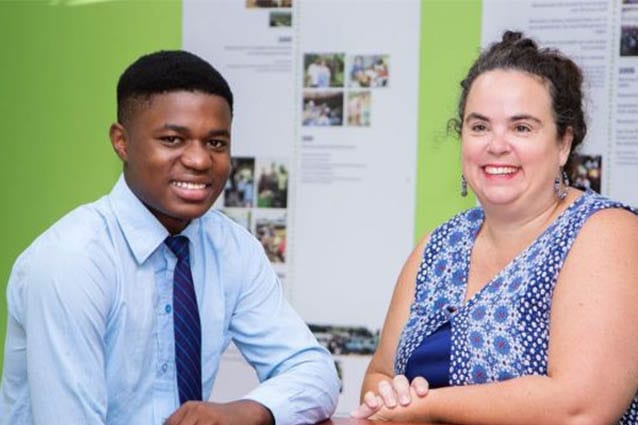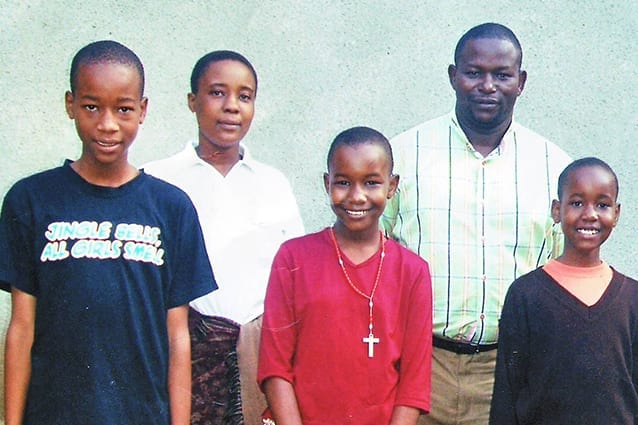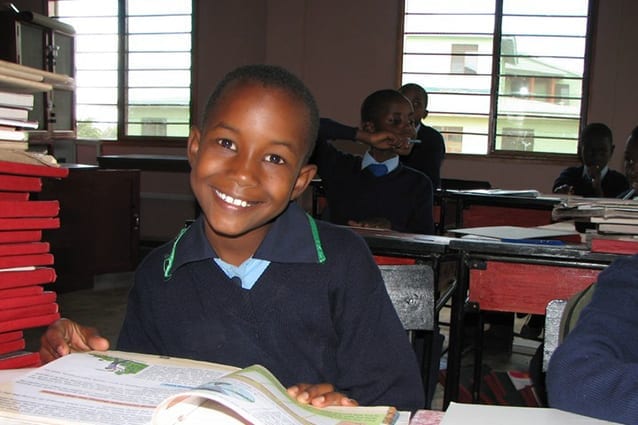Students from the Dominican College Wicklow were blessed with some great weather as they carried out a five-hour fundraising car wash at the school.
The event on Saturday, April 21, was held to raise funds for the School of St Jude in Tanzania.
The School of St Jude educates disadvantaged, bright students in the Arusha area of Tanzania to help them become moral and intellectual leaders in their country. The school receives no State funding so depends entirely on voluntary donations.
Some Dominican students will travel over to Tanzania in the summer.
Some of the students plan on running marathons to raise money while other fundraisers were held during the week, including a cinema day. The funds raised through the car wash are still being established but €22,000 had already been raised prior to that through a series of other different events.
Bray People (read the original article here).
Gemma Sisia’s parents, Sue and Basil, fervently believed in the power of education to change the future.
The couple, who raised eight children on a sheep wool farm in New South Wales, Australia, made significant sacrifices to ensure that their seven sons and one daughter had excellent educational opportunities. They also were strong believers in community service.
“They had an open-door policy at home for people wanting to come, stay, and have someone to listen to them,” she says. “My parents constantly showed me how important it is to help others.”
So, it’s not surprising that after she graduated from the Universities of Melbourne, Northern Territory and New England at 22 years of age, she took her newly minted Bachelor of Science degree and Graduate Diploma in Education to Africa. She taught math, science, and sewing at an under-resourced private girls’ school in Uganda.
She loved the work but was aware that her students’ parents were wealthy enough to afford private school for their girls. Gemma and the local art teacher who were good friends often talked about how to break the cycle of poverty that was rampant in East Africa, particularly for underprivileged girls. They concluded that without raising the standards of education across the board in the region, no amount of foreign money could alleviate the widespread poverty.
“That’s where the seed of building a school was planted,” she said.
Then came a fateful trip to Tanzania to visit one of that nation’s beautiful wildlife parks – and Gemma fell in love with her safari guide. The two married, and while Gemma was looking forward to raising her own family (the couple has four children), she knew she also wanted to pursue her dream of a school that would provide an excellent education to Tanzania’s poorest children.
She confided her dream to a close friend in Australia, who gave her 10 dollars. Gemma promptly opened up a bank account with that first donation. Her father-in-law gifted her with two acres of land in the Arusha District of Tanzania, so she’d have a site for the school. And her father, Basil, introduced her to the Rotarians.
Gemma shared her dream with local Rotary clubs in and around New South Wales. She told them the startling statistics of how poverty wrecks havoc with education in East Africa: according to UNICEF, 70 percent of children aged 14–17 years in Tanzania are not enrolled in school. Less than 4 percent make it to the final two years of secondary education.
“Without our school, these students might not attend school at all, or if they were one of the lucky few, their schooling would have been in an under-resourced government school with a handful of teachers for every 1,000 pupils,” she says. “And without a good education, they won’t be able to gain skilled employment, and their families would continue to lead lives of perpetual economic struggle.”
Gemma was persuasive. By the end of her “speaking engagement” weekend, the Rotary clubs raised $20,000 towards the school. Not only that, teams of volunteers out of the clubs came to Arusha to build the two blocks of classrooms and a playground. The Brisbane Planetarium Club built the foundations of the school library.
Gemma named the school after the patron saint of hopeless causes, saying it is a nod to her unwavering faith in a cause that thousands of people, united by a shared dream, have worked tirelessly to support.
The School of St Jude opened in 2002 with a mere three students, but it grew quickly. Now enrollment is almost 2,000 and the school’s three campuses (one primary, one secondary and one boarding) are spread over 50 acres. All the students attend on full scholarships, which not only pay for their teachers, books and supplies, but transportation, school uniforms and at least one hot meal a day. Students old enough to board (over two-thirds of the pupils attending St Jude’s) live in dorms on campus and are provided three meals a day.
The school has a competitive and highly extensive application process.
Each year, over 3,000 candidates from government schools are invited to attend the selection process (where up to 150 places are available across first-grade, seventh-grade and ninth-grade). They complete a series of tests, with the youngest needing to show an enthusiasm for learning and some proficiency in Swahili, the native language, and the older students completing tests in math, science, and English. Ultimately, the children will be taught in English, as most universities and jobs in the key professions require fluency in English.
The students who show the most promise are then assessed as to their financial and social circumstances to make sure the family falls within the income guidelines and are truly deserving of a place at St Jude’s.
Once they are accepted, they are given a free, high-quality and varied education, plus resources to help them in their post-secondary education or training. The co-educational student body reflects a wide swath of Tanzanian society, with students representing numerous religions and tribes.
Seventeen years after opening its doors, the first few cohorts have graduated from the school. Gemma says that most of these 392 graduates have undertaken a year of community service, voluntarily teaching core subjects to thousands of children in local government schools who otherwise wouldn’t have had teachers. Many have now also gone on to study at universities in much-needed fields such as medicine, engineering, law, and education.
“A number of our students have earned international recognition for science and entrepreneurship,” she adds, “and we will soon be seeing our first university graduates!”
Throughout it all, Rotarians and other Australian-based donors have been the core of The School of St Jude supporters, with a now growing donor-base in America too. Gemma returns to Australia every year for a multi-week tour to drum up support as part of the school’s annual fundraising campaign. It’s day after day of meetings, presentation, and events to secure the millions of dollars it takes to pay for a staff of about 300 local teachers and support staff as well as food, books, supplies, and campus maintenance.
“It’s always a killer itinerary, but it’s essential,” she says. “There are hundreds of local workers and thousands of students depending on it.”
Cindy May, Cindy May Marketing (read the original article here).
I can’t believe it’s that time of year again! My calendar is filling up fast, the wheels are in motion and it’s thrilling to think that in less than one month, Godwin, our 2018 graduate, and I will be touching down in Melbourne – the first stop on The School of St Jude’s 2019 promotional tour.
Godwin is an exceptional young man and a shining example of how St Jude’s, the school so many of you helped to build, is transforming lives and communities in Tanzania.
Respect, responsibility, honesty and kindness are key values that underpin St Jude’s. Many years ago, we decided to hang these words on signs across our school campuses. I dreamed our graduates would personify these qualities. Godwin does exactly that. I know you will love meeting him during the promotional tour, and I certainly look forward to catching up with old friends and making many new ones.
Between late February and the end of March, Godwin and I will be zipping between Australia’s eastern and southern coasts and hopping over to visit our friends in New Zealand.
Click here for a list of upcoming events in each region.
See you soon, mates!
Gemma Sisia, Founder, The School of St Jude
The Rotary Club of Wicklow is organising a table quiz and dinner to help students from the Dominican College Wicklow to raise funds for the School of St Jude in Tanzania.
It may be over 11,000km from Wicklow town to Tanzania, but students from the local Dominican College are making an enormous contribution in bringing both countries together through a visionary educational project. Tanzania has endemic poverty and is unable to provide its children with a quality education as the government school system is overstretched and vastly under-resourced.
The School of St Jude was formed in 2002 and educates disadvantaged students. When they finish their education they then return to their communities to demonstrate educational leadership in Tanzania. The school receives no State funding so depends entirely on voluntary donations. A few years ago students from Dominican College decided to help by raising €3,000 each month which goes directly to the school.
The Rotary Club of Wicklow has supported the Dominican students fundraising campaign for St. Jude's since it was initiated. On Friday, March 23, Rotary is hosting a table quiz in the Grand Hotel at 7.30 p.m. in collaboration with the Dominican students and their supporters to increase its funding.
'We urge people in Wicklow to come out and support this visionary project and also learn about the remarkable work carried out by local students,' said Pat Kerr, President of Wicklow Rotary. 'They have shown remarkable skills and initiative in supporting this worthwhile educational venture and we are delighted to support them.'
Teacher John O'Brien said the school is extremely proud of the efforts of the Wicklow students.
'They have raised over €100,000 for the school of St Jude and also sponsor students in helping to give them an education and a chance in life that they would not otherwise have. Drawn from families who often live on less than €1 per day, the pupils of St Jude's are shining examples of what students can achieve when they are given the opportunity to receive a quality education.'
Those wishing to attend can contact John O'Brien on (0404) 68111 or (087) 6598309 or Pat Kerr at (086) 3398390. The Tickets are priced at €30 each or €120 for a team of four.
Michael Buchanan, Wicklow People (read the original article here).
Edgar Tarimo is changing the world one brick at a time.
The teenage schoolboy from Tanzania just won a top international environment prize with his inspired project making house bricks out of plastic waste.
The 17-year-old now hopes that one day thousands of homes all over the developing world will be built out of the recycled plastic bottles, bags and packaging – and he wants to thank Australia for making it all possible.
For without Australian teacher Gemma Sisia who set up a school in poverty-stricken northern Tanzania and awarded him a free scholarship, and the thousands of Australians who support her every week with donations, he would never have been able to follow his dream of improving housing in his country.
“Being at her school has taught me how to think outside of the box and to see possibilities and opportunities out there in the world,” says Edgar, smiling.

Schoolboy Edgar Tarimo with his Australian teacher Gemma Sisia, who started a school in Tanzania 16 years ago with just three students.
“Gemma is the person who’s changed my life. I’m a new person because of the education she’s given me. If she hadn’t come and built her school, with other Australians sending over funds to help, I have no idea what I’d be doing now – if anything at all.”
Edgar is just back home from a trip to Sweden to accept the 2017 Children’s Climate Prize for his scheme recycling plastics to build permanent homes. The idea came to him after seeing mud-brick houses in the nation’s capital Dar es Salaam swept away in floods, and knowing how plastic litter is destroying the countryside.
He’s a pupil at the School of St Jude in Tanzania’s second city Arusha started by education pioneer Gemma Sisia. From a sheep property in Armidale, she went to Africa for a holiday, fell in love with her Tanzanian safari guide and then built the school 16 years ago on some land donated by her new father-in-law.
She began with just herself and three pupils. Today, she has 2000 students and 350 staff, and her school is recognised as one of the best in East Africa.
“It’s so wonderful to see kids like Edgar flourishing and it gives energy and inspiration to all the other children to see him do so well,” says Gemma, now with four children of her own, aged between16 and five. “He’s a very humble boy, but he’s passionate and quietly driven to change the world.
“When you have kids who grow up with very little, that struggle can end up becoming a real gift. Of course, it’s not nice to see them struggle, but it helps them appreciate what they’ve got and teaches them to be strong and determined.
“They come from poverty-stricken families and, as a result, they aren’t pushovers. So if someone tells them something isn’t possible, they’ll go on to the next person, or if one door closes, they’ll knock on the next.” “
Edgar has also been recognised as a next-generation young African entrepreneurial leader as first runner-up of the Anzisha Prize, and now employs five people full-time in his building venture Green Venture Recycles, and over 80 part-time who collect discarded plastics for him.
There are hopes that his trash-to-treasure vision may become Africa-wide, and then start to transform housing in the developing world.
Edgar’s sponsor is a Sydney donor to the school, and 90 per cent of the funding to keep the school going is raised by Australians.
“We’re grateful for every donation, however big, or however small. We love Australians visiting us here, or volunteering to help us, or just giving. And when you see kids like Edgar changing the world, then you can see how valuable this is.”
Sue Williams, Domain (read the original article here).
While most students spend their school holidays taking a well-earnt break from study and catching up with friends and family in their home communities, Lina, a current Form 6 student, is going the extra mile to make an impact on children and their parents in her village.
You may recognise Lina as one of the faces of our 2018 Annual Appeal. Her enthusiasm and compassion shine radiantly through her smile, and she is respected among her peers as a role model and friend to all.
Lina gathered together 15 of her St Jude’s compatriots during the school holidays to volunteer in local government schools, helping students to improve their English. The program, which comes free of charge to all who participate, was so successful, that Lina took her English lessons into students’ homes and also teaches their parents, many of whom have not themselves completed primary school.
“We at St Jude’s have grown up receiving. We understand about giving to the community from the bottom of our hearts,” Lina expressed.

“So far, I have helped 10 parents to improve their English speaking ability. Many parents who run small businesses are exploited by people who take advantage of their lack of education. With improved English, they can better understand the conversations being had around them and empower themselves.”
“To order stock for a business, you sometimes need to order things online, and the main language is English. Many parents also want to help children with their homework sometimes, but they cannot, because they do not understand the language their children are learning,” she added.

Lina has successfully overcome a number of challenges in her pursuit of service, and is keen to expand her reach.
“Some parents did not believe that I do not want money for this. When they can see I am serious about volunteering, they realise I have a genuine heart to help the community, and they give me their very best wishes.”
“I really feel this project has a bright future. My main aim is to help St Jude’s students who are privileged to receive free education, understand the importance of helping others. I hope to complete Form 6 successfully and join Beyond St Jude’s. I want my friends to do the same, so we can help to address the problem of lack of resources in government schools.”